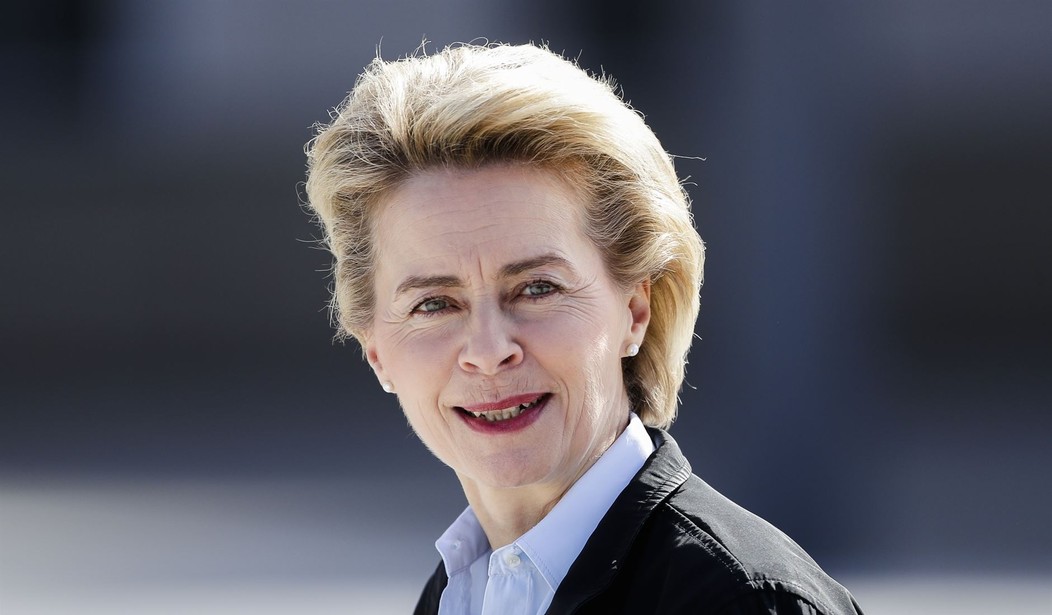Incrementalism is not just an exclusive American foreign-policy export in the Russia-Ukraine war. More than 100 days after Vladimir Putin ordered troops to invade Ukraine and annex them forcibly into Russia, the European Union finally took aim at Putin’s pocketbook by ordering an oil embargo. It took them more than three months to finally concoct a deal that would pass unanimously to block profits from going into Putin’s war machine:
After adopting a sweeping embargo on Russian oil, European Union leaders continuing their summit in Brussels on Tuesday are set to seek further ways to tighten the economic vise on the Kremlin while also looking to prop up Ukraine’s economy, which has been strangled by the Russian invasion.
After working late into the night on Monday to secure agreement on the oil embargo, leaders returned Tuesday morning to confront a thicket of complicated issues related to Ukraine, including looking for ways to unblock huge amounts of grain stuck at Ukrainian ports that are under Russian blockade.
But even that’s incremental. Rather than block all oil sales from Russia in Europe, the EU action leaves loopholes the size of Mack trucks for those sales to continue. Or perhaps more accurately, loopholes the size of pipelines:
After weeks of negotiations, the 27 countries agreed Monday to end seaborne deliveries of Russian oil within months. Pipeline deliveries will continue to flow for now. Several countries will also get extensions or exemptions, according to E.U. officials and diplomats.
European Council President Charles Michel said the agreement would cover more than two-thirds of imports of Russian oil, cutting off a “a huge source of financing for [Russia’s] war machine.” Officials and diplomats will still have to agree on technical details in the coming days, and the sanctions must be formally adopted by all 27 nations. E.U. leaders meet again Tuesday to discuss the Russian invasion.
Hungarian Prime Minister Victor Orban, a perennial E.U. spoiler and one of Russian President Vladimir Putin’s closest allies in Europe, had obstructed a deal, insisting on more time and money to upgrade his country’s oil infrastructure. Orban said a faster phaseout would be like dropping “a nuclear bomb on the Hungarian economy.”
Will this cut off some sales of Russian oil? Sure, but likely not the full two-thirds. Russia will sell more off of its pipelines instead, even while their tankers get blocked from EU ports. The nature of the “extensions or exemptions” remains to be seen as well, which hint that the hit to Putin’s pocketbook may not be dramatic in the short term, or perhaps even in the medium term.
The pipeline exemption provides wide benefits to central Europe, for instance:
The exemption for pipeline oil allows continued supplies through the Druzhba network, which runs through Belarus to Poland and on to Germany, and through Ukraine to Slovakia, the Czech Republic and Hungary.
E.U. officials say pipeline oil accounts for a third of imports. But if Germany and Poland keep their pledges to phase out Russian oil by the end of the year, Russia will be sending less than that. Von der Leyen wrote online that the new deal “will effectively cut around 90 percent of oil imports from Russia” to the European Union by the end of the year.
We’ll see, but this isn’t exactly a promising start. The incremental approach to the policy gives Russia time to phase out its current export strategies and find new buyers, too. There will be considerable cost to reconfiguring Russian infrastructure for that purpose, and perhaps a need to deeply discount sales to attract customers willing to overcome the risk of running afoul of banking sanctions.
By the way, the EU still hasn’t acted to block Russian natural-gas imports. This new policy does not apply to gas purchases, a choice once again being driven by Germany:
Austria and Germany have ruled out any European Union embargo on Russian gas imports after a Brussels summit agreed a partial oil ban last night.
Poland, Estonia, Latvia and Lithuania are already pushing to step up Russian energy sanctions to keep the pressure on President Putin, but the EU appears to have hit the political limit on gas imports.
Setting the scene for a new clash over sanctions, Karl Nehammer, the Austrian chancellor, said that there could be no question of suspending gas imports because of the effect on major European economies, such as Germany’s.
“The gas embargo will not be a topic, Olaf Scholz has made this clear as well,” he said[.]
Russia widened its gas cuts to Europe on Tuesday with Gazprom turning off supply to top Dutch trader GasTerra escalating the economic battle between Moscow and Brussels and pushing up European gas prices.
The move comes a day after Denmark flagged a potential end to its Russian gas supply and the European Union’s toughest measure yet against Russia for its invasion of Ukraine, an agreement to halt sea-borne imports of its oil.
GasTerra, which buys and trades gas on behalf of the Dutch government, said it had contracted elsewhere for the 2 billion cubic metres (bcm) of gas it had expected to receive from Gazprom through October.
All of this demonstrates that Putin planned his moves well when he got the EU addicted to cheap Russian energy. The EU is in effect still bankrolling his imperial aggression in Ukraine eight years after invading Ukraine the first time and seizing Crimea and control of the Donbas. They’re still funding the war effort against the rest of Ukraine, even while flooding Ukraine with superior weaponry to fight the Russians. This represents a stunning failure of both energy and security policy not just for the past 100 days but for a decade or more. And that’s been true on both sides of the Atlantic.









Join the conversation as a VIP Member